Such a rich day we must give you all the details…
With Dave leaving the country on Sunday, today was the last chance to complete the NGO papers. We were off to the Deputy District Commissioner’s office at 8:30am sharp with a bulldog determination. Mr. Satwinda (the Deputy DC) looked over our papers and said everything seemed in order. He instructed us to go to the Central Police (CP) for an interview with the Intelligence Unit. He explained that he would send a messenger ahead with our paperwork, and we should report to Room 100 when we got to the Police station. Anyone applying to be an NGO must go through this interview process.
Upon arriving at CP we found Room 100 locked. A good Samaritan said he would help us find the person in charge. We eventually located Mr. Musunga (not to be confused with “musungu”—white person—musunga translates as porridge) who ushered us back to Room 100. We were tickled that he fit a perfect cross-cultural stereotype of a high-up police officer—smoking, gruff yet well-dressed in his coat and tie. During several interactions with him over the next couple of days, we decided we liked him and that we could see his big heart under his tough cop exterior.
Our first hurdle was that Mr. Musunga could not find the paperwork that the messenger had supposedly delivered. We called the Deputy D.C.’s office to inquire and were told that the messenger had also found the door locked and simply returned to the DC office with the papers. (Communication challenges seem also to be cross-cultural.) While we waited for the papers to be redelivered, Mr. Musunga asked us a series of questions about who we are, why we were here, and why we want to do this work. Throughout the conversation there were numerous interruptions, cell phone calls and colleagues entering the office. Mr. Mwanawasa, the President of Zambia, was in town. He was attending the funeral of a close friend who had died in Ndola. The entire city was on alert and, of course, the police had the responsibility for keeping him protected during his visit.
As our interview was coming to a close, Mr. Musunga asked us how much we were paying to process the NGO papers. When we told him K3 million (around $750) he balked, remarking that this is way too much. He insisted that the proper amount is K 250,000 and went to ask his superior for a second opinion. He came back convinced that we were being overcharged. He instructed us to return to the Deputy DC’s office and refuse to pay anything more than K 250,000. However, having seen an official looking document on the Deputy DC’s wall stating the fees for various types of NGOs and also trusting the DC completely, we were puzzled by Mr. Musunga’s reaction. Not wanting to seem disrespectful to Mr. Musunga’s position, we promised we would return to the Deputy DC’s office to sort it out.
Back at the DC’s office, Mr. Satwinda seemed mildly annoyed that the police would enter into the financial side of this negotiation and insisted, albeit gently and respectfully, that the fee was indeed K3 million. Mr. Satwinda suggested we go back to Mr. Musunga, explain the situation, and call Mr. Satwinda on our cell phone while we were with Mr. Musunga if need be. Our heads were beginning to spin, not quite sure where the balance of power lies and how to navigate these bureaucratic waters. Additionally, both Mr. Satwinda and Mr. Musunga were leaving their offices, along with every other city official as far as we could tell, to participate in the Presidential visit. We had explained to both officials that Dave was leaving the country on Sunday, and they agreed that they had received everything they needed from Dave. Disappointed and a bit apprehensive that we would have to delay this process yet another day, we decided to accept our fate and schedule completion for Monday.
The up side of our frustrated NGO plans was that we had a few unexpected free minutes, which we decided to spend at the local crafts market purchasing some of the beautifully handcrafted items we bring home to sell to support the work in Kantolomba. By the time we finished at the market, Dave needed to make his way to Kantolomba for his appointment with Mr. Banda, the man Mr. Chaila had sent to do the survey for the well. Jen and Pauline remained in town to price a new stove for the Living Compassion house.
Mr. Banda met us exactly on time in Kantolomba—a rare occurrence in this part of the world—with four assistants. Mr. Banda, we quickly discovered, is young and energetic, with all of the typical humor and graciousness of the Zambian people, and with more than his share of cleverness, as well. Together we scouted the Living Compassion property. Mr. Banda studied the rock formations and the contours of the land, sharing his thoughts out loud. While he scouted and assessed, his assistants unloaded a complex-looking instrument from their pick-up and wired it to the vehicle’s battery. Meanwhile, a crowd of curious Kantolomba residents gathered to watch the spectacle, and to wonder, most likely, what these crazy musungus were up to now.
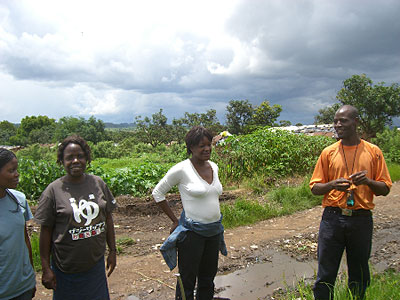
Mr. Banda and his team
Over the next two hours, as Mr. Banda explained to us, the team sent electrical bursts through the rock beneath our feet to measure its density. He spent most of that time huddled over the instrument on the ground, recording numbers in a notebook, and occasionally shouting directions to his companions. When at last they were finished, Mr. Banda charted his readings on a series of graphs. After studying them for a time, he showed them to us and said, “I am finding porous rock between 20 and 50 meters. I think we shall find water down there.”
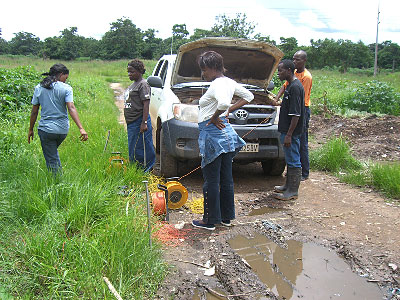
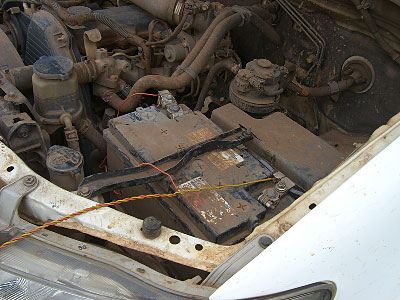
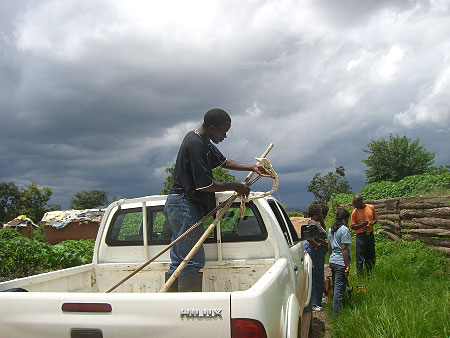
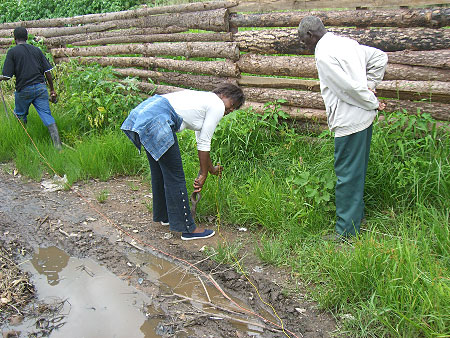
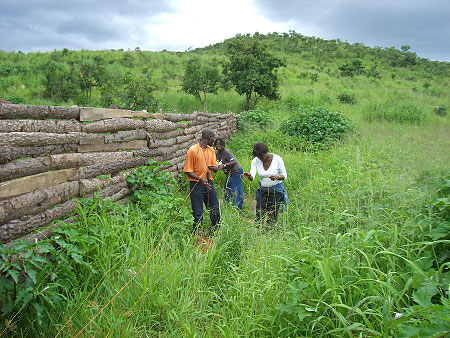
There were congratulations all around. With a little luck and a lot of persistence, we will drink clean water in Kantolomba in April.
Meanwhile, back in town… Pauline and Jen had found what seemed to be the best stove available, but the store did not offer transport. We decided we would purchase the stove the next day and pray that we could fit it in the back of our own vehicle. Just as we were finishing at the appliance store a heavy downpour began. We stood under the overhang of the store, along with dozens of other waylaid pedestrians, waiting for the torrent to let up. This is a common scene in the rainy season—the city is bustling, everyone going about their business, and suddenly there is a waterfall from the sky and everything stops, like someone pressed pause on the scene of a movie. People stand under cover and wait. Usually just a few minutes later the rain ends and the scene picks up exactly where it left off. To locals it is probably a non-event. We experience it as a bonding activity.
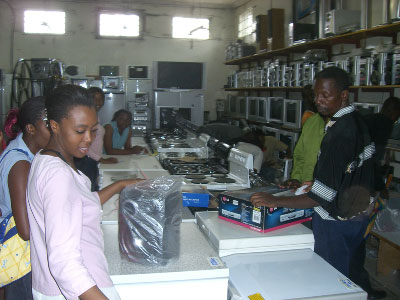
When the rain let up, we headed back to the guesthouse for some lunch. An interesting conversation ensued. Pauline and Theresa were recounting their days as young students. Both had excellent grades. Both were candidates for top high schools and then university. Neither had the financial support needed to pursue education. Pauline ended in grade twelve, Theresa in grade seven. Pauline remarked that there are countless highly intelligent adults in Zambia with unfulfilled dreams. When we asked if either of them had such an unfulfilled dream, Pauline said she had always wanted to be a nurse, Theresa a doctor. Knowing these ladies as we do now, there is no question such goals would have been achievable for them. They take joy in giving their own children and the children in the Living Compassion programs the opportunities they did not have. As do we.
Later the conversation turned toward the work we do in the United States and their questions about our retreats and workshops and how the Monastery operates. We have talked with our colleagues here in Zambia about our other work and as we get to know each other better and begin to learn about each other’s cultures, the conversation deepens. They were especially interested in the silence and the idea of not “just chatting.” Pauline laughed at one point and turned to Theresa remarking, “I think we could prevent a lot of trouble for ourselves by not talking.” They were very excited at the prospect of one day holding awareness practice retreats here in Zambia. So are we!
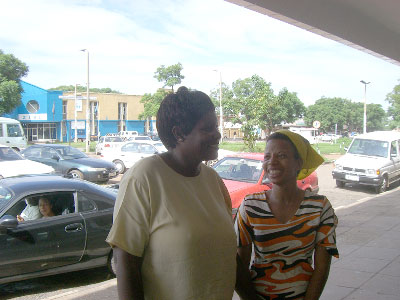
Theresa and Pauline
After lunch we set off for the private school Theresa would like the younger children in the house to attend. Pauline needed to go home so we dropped her at a minibus station along the way. Due to rising fuel prices, the fares for the mini bus have just gone up. Wages, however, have not. Pauline, for example, has not received an increase in her wage at the hotel for over three years!
The private school does not differ much in appearance from the government school the children currently attend. The classrooms are fairly run down—certainly by our standards. The desks are old. The schoolyard is bare. But, the class sizes are around 20 instead of 50; there is a teacher for every class, and she/he is in the room teaching when the students are there (a subtle, but important point); the school day is 5 hours instead of 2 ½; the school has workbooks for the students; and the toilets function! The tuition is about $12 per month per child. Enrolling the children from the Living Compassion house in this school will not be a magic pill for getting them caught up, but it will give them a fighting chance. There is remedial education offered in the afternoons for the children who need it—all of our children do. We are so happy to give them this boost.
The new school is near the Living Compassion house so we stopped in to visit with the children. When we were here in October, we helped Theresa talk with the children about the importance of caring for their personal belongings and for the house as a whole. As we walked in, we teased them that we were headed to their bedrooms to inspect. They ran giggling to their rooms to make final adjustments. Indeed, it is clear they have made increased efforts to keep the house in good order.
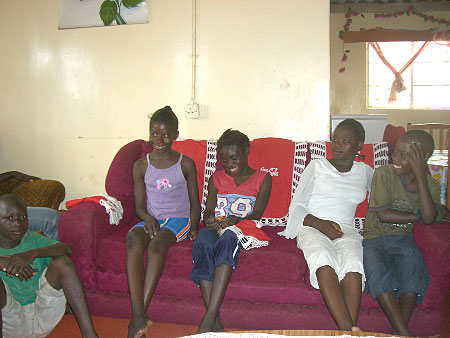
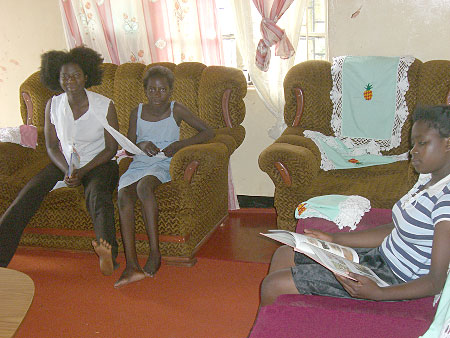
It is fun to see the children so happy, obviously adjusting well to having Theresa as their main caretaker.
We then made our way back into town to make some appointments for Monday, our last business day before leaving the country. We stopped in at the internet café, spent a good deal of time writing Cheri an email detailing all the current news, and were unable to send it! There is never a shortage of letting go opportunities on these adventures.
Back at the guesthouse we fulfilled our usual roles: Dave cooking a delicious dinner, Jen attending to paperwork and phone calls. After dinner we worked together to lay out a sketch of the new building in Kantolomba in preparation for a meeting with Steve the next day.
